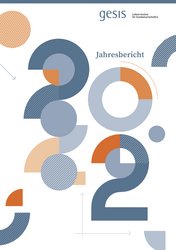Mission Statement
GESIS – All About Research Data
GESIS supports the advance of social science research and stands for innovation, quality, competence, sustainability, and independence in the establishment and operation of research infrastructure. We develop and study methods for the collection, processing, archiving and analysis of data for social science issues, and provide it together with a comprehensive portfolio of services. Our services are research-based. They are geared to the needs of our target groups, and support researchers in all phases of their research.
As the largest social science infrastructure institution in Europe and one of the most important worldwide, we are in a key position, and as an active member of the Leibniz Association, we are part of a strong community.
GESIS –Quality and Interdisciplinarity
High-quality research data are the focus of our interest and shape our service portfolio. We are constantly striving to improve methods and quality management of data collection, processing, archiving, and analysis. Our expertise in research data makes us the first point of contact and advocacy for a wide range of social science research communities in Germany, Europe and the world. Through our interdisciplinary research and cooperation with research infrastructures in disciplines beyond the social sciences, we live and promote cross-disciplinary cooperation on issues relevant for society.
We are committed to the rules of good scientific practice, follow Open Science principles and communicate our own research to the public. Thus, we make our research comprehensible and strengthen the confidence in science.
GESIS – United for Research
GESIS is constantly evolving and responding to challenges and opportunities. All employees at GESIS contribute to improving social science research. We work towards this goal and use the interdisciplinary setup of the institute to achieve it. GESIS actively facilitates structured and competence-oriented professional development for all employees.
GESIS is committed to appreciative and respectful collaboration and lives an open feedback and error culture, for which managers bear a special responsibility. GESIS creates a working environment free of discrimination and barriers and promotes gender equality, family friendliness, and diversity.
Strategy
Strategies and strategic objectives are central elements of GESIS’ management and serve the further development of the institute as well as its services. GESIS develops its strategies along a kind of cascade. Starting point is the statutes of GESIS with which all the strategic considerations are consistent.
On this basis, GESIS has formulated the following long-term principles in its Programme Planning. These are to be seen as a strategic orientation which also affects medium- and short-term objectives:
- GESIS sets national and international standards with its infrastructure offerings.
- GESIS conducts excellent disciplinary and interdisciplinary research and thus strengthens its infrastructure services.
- GESIS is linked with all relevant national and international actors.
- GESIS is organized in such a way that it achieves its objectives optimally, enables cross-departmental cooperation as well as the integration of research and infrastructure tasks.
- GESIS supports its employees and is characterized by an internationally attractive work environment, clear structures and transparent communication. Structured further training, reconciling work and family life, equal opportunities for women and men, and occupational health management are key principles.
- The principle of profitability and economy shall apply to the GESIS management for its public resources.
The strategic objectives are regularly reviewed and adjusted if necessary. They receive a high degree of commitment through their documentation in the annual Programme Budget. The medium- to short-term goals defined therein are discussed by scientific peers in the Scientific Advisory Board and confirmed by the Board of Trustees as the supervisory body of GESIS.
If necessary, separate strategy papers are created for specific areas of Programme Planning or for individual topics. These are oriented in principle to the mission statement and the Programme Planning, but their strategic content is more focused on specific topics and includes both goals of action and implementation steps.
In addition, the departments work out their own strategy papers which are in line with the GESIS-wide objectives and serve the internal planning and management of the units.
Tradition
Founded 1986 as "Gesellschaft Sozialwissenschaftlicher Infrastruktureinrichtungen" GESIS initially consisted of three legally independent institutes, the "InformationsZentrum Sozialwissenschaften" (IZ) in Bonn, the "Zentralarchiv für Empirische Sozialforschung" (ZA) in Cologne and the "Zentrum für Umfragen, Methoden und Analysen" (ZUMA) in Mannheim.
These three institutes were merged 2007 into one infrastructure which has been included in the Leibniz Association and since November 2008 has introduced the name "Leibniz Institute for Social Sciences".


